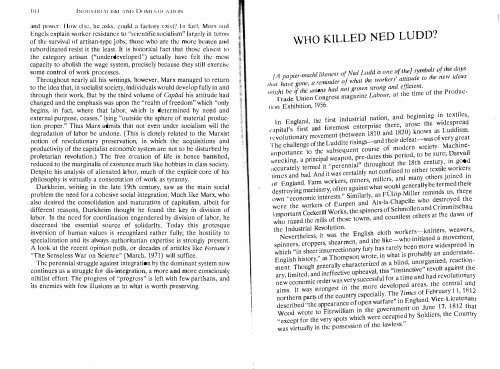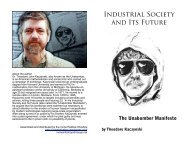CONTENTS - ouroboros ponderosa
CONTENTS - ouroboros ponderosa
CONTENTS - ouroboros ponderosa
Create successful ePaper yourself
Turn your PDF publications into a flip-book with our unique Google optimized e-Paper software.
IIJ.I INIHISII' Ir\I.lSM ANI ) 1)(IMI-Sllt 'Al lt 'N<br />
and powcr Ilow el . . . . I ' k<br />
.<br />
.<br />
st:, 1C as 's, could a flcLorv . t'J I f<br />
Engels explain worker resistan . , " . ," t ' . .. .J CIS . n act, Marx alld<br />
Lletlhc<br />
socIalism" largely in terms<br />
c who arc the more hcaten aJIII<br />
of the survival of artisantypc eb t<br />
subordinated resist it the leas It' 'is h<br />
the category artisan ("underd 1<br />
t oneal lact that those closest to<br />
eve ope , ') actually have fclt the most<br />
capacity to abolish the wage system, precisely because they still exerci;c '<br />
some control of wo r k processcs.<br />
Throughout nearly all his writin h<br />
to the idea that, in socialist society gS'd' o evr, Marx managed to return<br />
through their work. But by the thO ' IV ;<br />
ua s would deveop fully in and<br />
changed and the emphasis was upr tO me of CapJlal hIS attitude had<br />
l<br />
begins, in fact, where that labor n wh ;ea of frcedom" which "only<br />
external purpose ceases " . c IS etermincd by need and<br />
I i '"<br />
tion proper." Th'us Mar a7 outsIde the sphere of material produc·<br />
.<br />
degradation of labor bc undon ts t ( not e (<br />
en under socialism will the<br />
notion of revolutionary pre e. IS I . S c osely related to the Marxist<br />
serva f Ion, In whIch the acquisitions and<br />
productivity of the capitalist e<br />
proletarian revolution.) The e <br />
system are, not to be disturbed by<br />
alton ?f Itfe IS hence banished,<br />
reduced to the marginalia of existence much lIke hobbles III class society.<br />
Despite his analysis of alienated I b<br />
philosophy is virtually a conseerato or, f mueh of the explicit core of his<br />
k<br />
D . . I n 0 war as tyranny ' . ur khelm, ' wntmg m the late 19th ce<br />
.<br />
'<br />
problem the need for a cohesl've . ntury, saw as the maIn social<br />
socIa I Integration , M ch J'k M<br />
. a Iso<br />
deSIred the consolidatio d ' u I e arx, who<br />
different reasons, Durkheim n th an ;;, auratIOn of capitalism, albeit for<br />
aug t e found the key Il1 division of<br />
labor. In the need for coord'<br />
discerned the essential sonatlon / ng <br />
ndered by division of labor, he<br />
inversion of human valus i ;ce so Idanty. Today this grotesque<br />
0 re specialization and its always theogmed rather fully; the hostility to<br />
au ontanan expertise I 's S t rong I y present.<br />
A I oak at the recent 0 in'<br />
"The Senseless War o se :I (r cades of rtielcs like Fortune's The perennial struggle against inte rati9 71) wIll suffIce.<br />
by the dommant system now<br />
contmues as a struggle for d' .' t .<br />
nihilist effort. The progress / r o: a ore and more consciously<br />
P g SS<br />
Its enemies with fe . IS left WIth few partIsans and<br />
w I '11USlons ' as to what IS worth preserving. '<br />
WHO KILLED NED LUDD?<br />
1/1 papier.mache likeness of Ned Ludd is one of the 1 symbols of the days<br />
,""I have gone, a reminder of what the workers' attitude to the new ideas<br />
might be if the unions had not grown strong and efficient.<br />
Trade Union Congress magazine Labour, at the time of the Produe·<br />
I it 111 Exhibition, 1956.<br />
I n England, the first industrial nation, and beginning in textiles,<br />
capital'S first and foremost enterprise there, arose the widespread<br />
(evolutionary movement (between 1810 and 1820) known as Luddism,<br />
'I'he challenge of the Luddite risings-and their defeat-was of very great<br />
importance to the subsequent course of modern society. Machine<br />
wrecking, a principal weapon, pre·dates this period, to be sure; Darvall<br />
limes and bad, And it was certainly not confined to either textile workers<br />
accurately termed it "perennial" throughout the 18th century, in good<br />
or England. Farm workers, miners, millers, and many others joined in<br />
destroying machinery, often against what would generally be termed their<br />
own "economic interests." Similarly, as FUlop·Miller reminds us, there<br />
were the workers of Eurpen and Aix·la·Chapclle who destroyed the<br />
important Cockerill Works, the spinners of Schmoll en and Crimmitschau<br />
who razed the mills of those towns, and countless others at the dawn of<br />
the Industrial Revolution.<br />
Nevertheless, it was the English cloth workers-knitters, weavers<br />
spinners, croppers, shcarmen, and the like-who initiated a movement<br />
which "in sheer insurrectionary fury has rarely been more widespread i<br />
English history," as Thompson wrote, in what is probably an understate·<br />
ment. Though generally characterized as a blind, unorganized, reaction·<br />
ary, limited, and ineffective upheaval, this "instinctive" revolt against the<br />
new economic order was very successful for a time and had revolutionary<br />
aims. It was strongest in the more developed areas, the central and<br />
northern parts of the country especially. The 11mes of Fehruary 11, 1812<br />
described "the appearance of open warfare" in England. Vice· Lieutenant<br />
Wood wrote to Fitzwilliam in the government on June 17, 1812 that<br />
"except for the very spots which were occupied by Soldiers, the Country<br />
was virtually in the possession of the lawless."<br />
,






